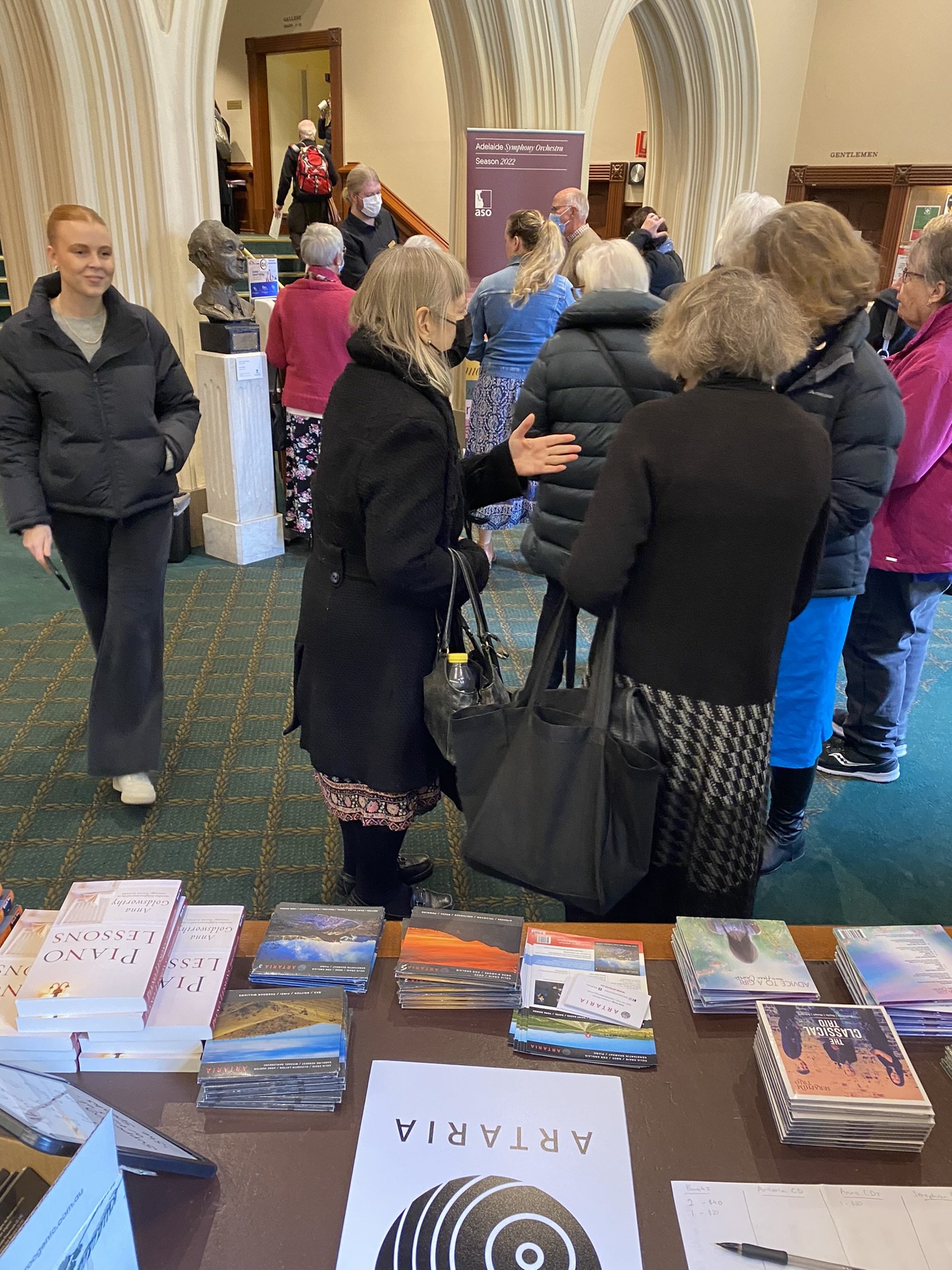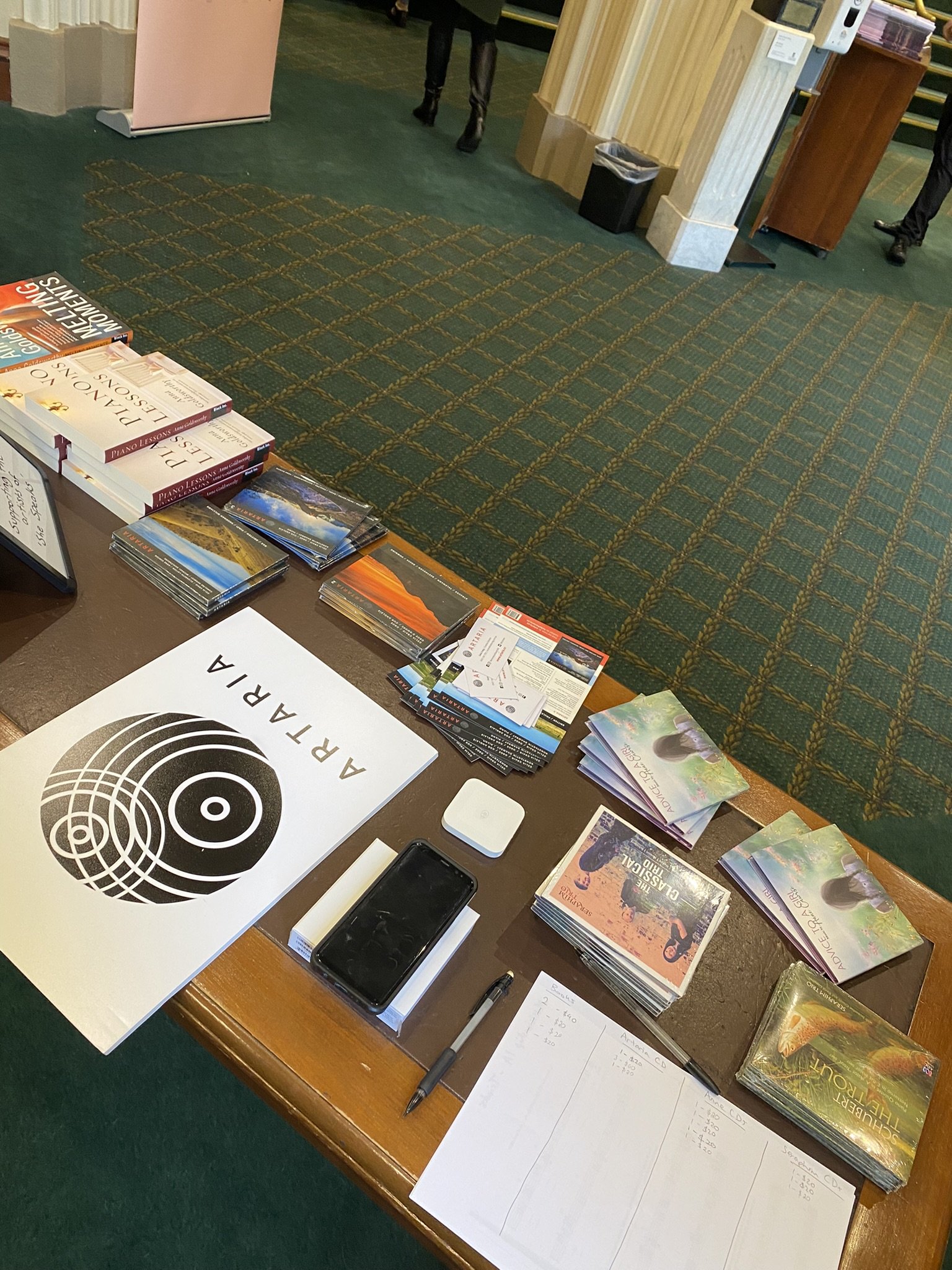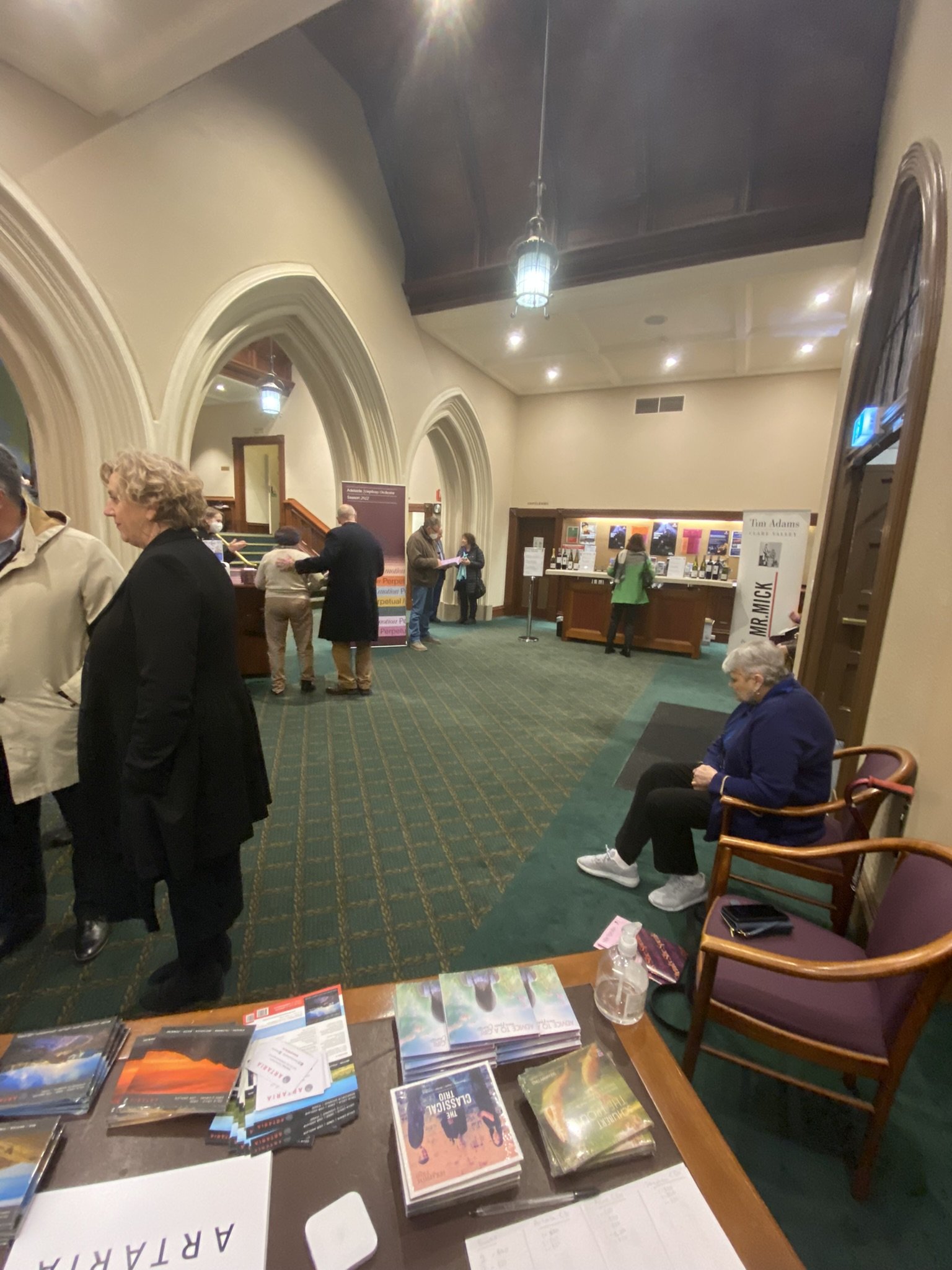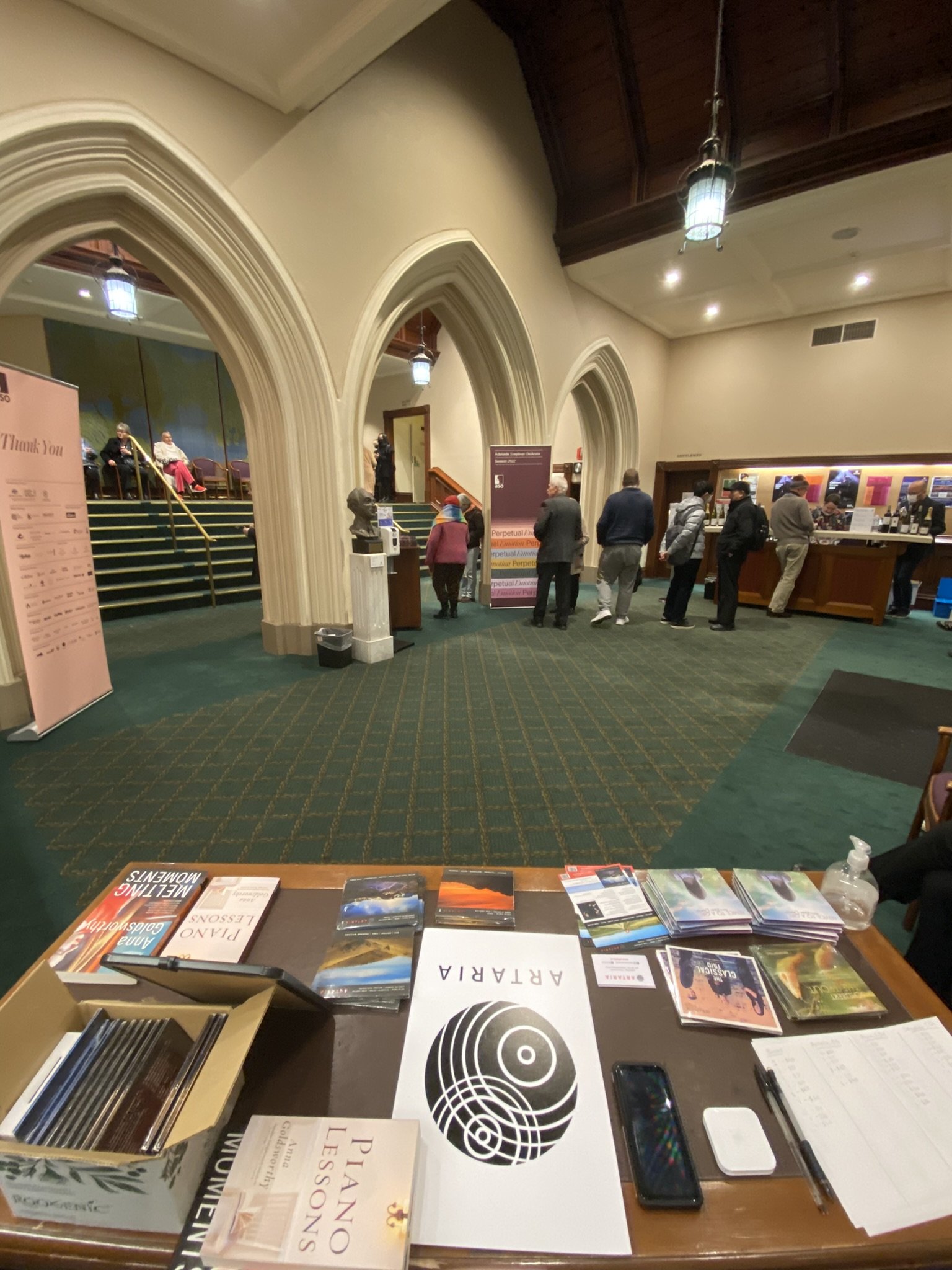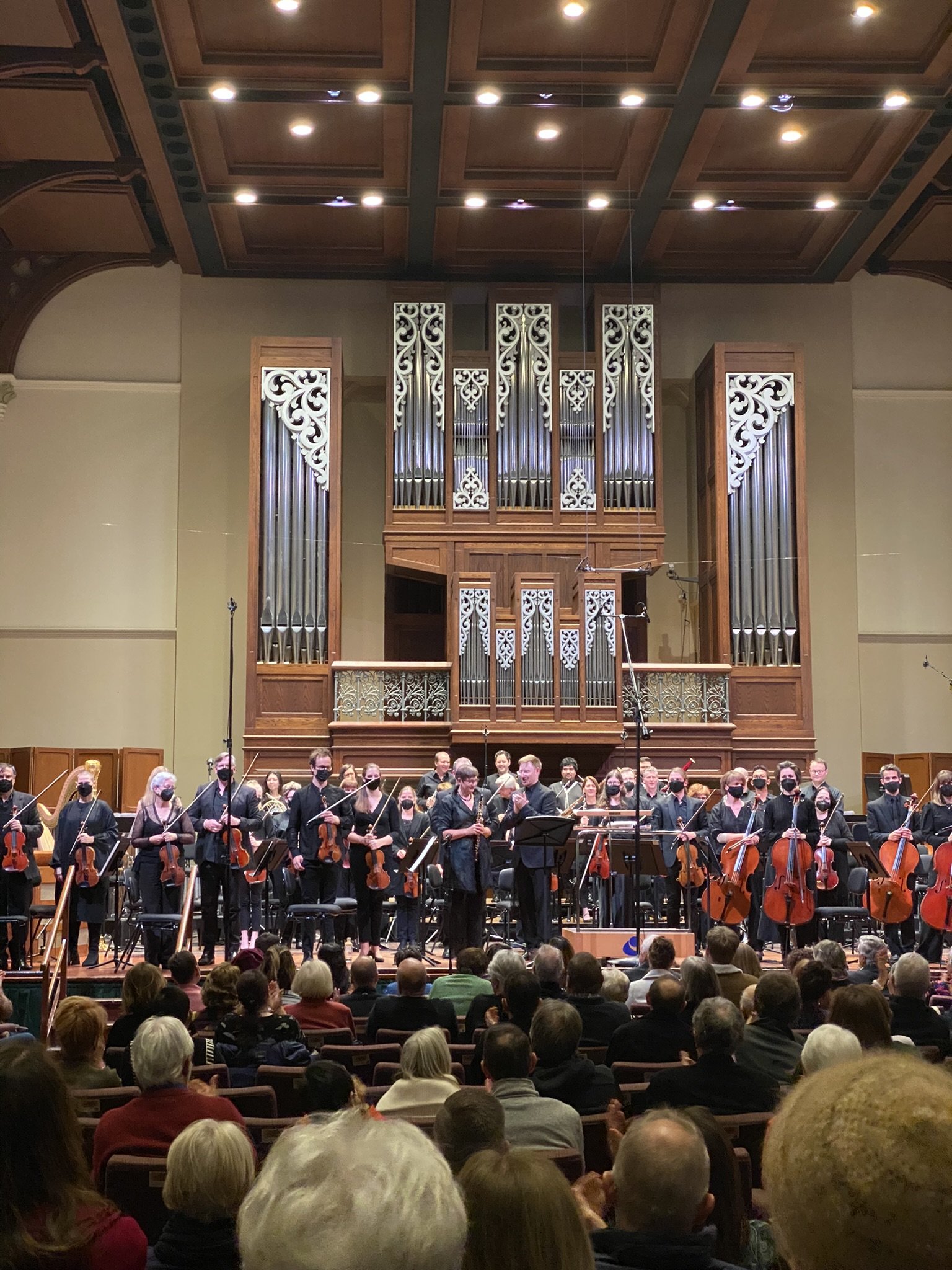She Speaks 2022 - Hannah’s Thoughts
At the beginning of July, I had the privilege of travelling to Adelaide for She Speaks 2022. This was two days of performances and conversations celebrating music written by women. The inaugural She Speaks events happened in 2021 with 2022 doubling the music on offer. She Speaks 2022 was curated by composer Anne Cawrse and writer & pianist Anna Goldsworthy.
This was 2 days, 5 concerts, 7 events, 24 composers, 30 works, and over 90 musicians. I had an absolutely amazing time, and was left feeling inspired after hearing all this music that is so often left unheard in concert halls.
If you want to see the full PDF program & all rep performed go here.
A few times the remark was made that “Hannah has come all the way from Perth just for these events,” it seems this was a rarity or a surprise for most. I guess I had travelled 2696km from home just to come to these events. Everyone I met was so welcoming to me, I am so glad to have connected with so many incredible people and so grateful to have had this opportunity. When doing the Orchestral stats late last year, I had ruled out the potential for travelling to these events and I am blown away that I was able to make this happen.
Below are some of my thoughts after day 1 and then on my plane journey to Sydney after the two days.
Day 1 - Fri 1 July 2022
I’m feeling super inspired. So many of the historical women were so up against adversity and still produced music in spite of the standards society tried to hold them to.
Anna Goldsworthy introduced the first concert ‘Trailblazers’ and mentioned the quote from Virginia Woolf’s A Room of One’s Own 'I would venture to guess that Anon, who wrote so many poems without signing them, was often a woman.' - noting that the same could be said of all those lullabies and tunes that many of us know so well. With women’s music-making reserved for the private sphere rather than the public sphere this quote really resonated with me. Women have always been making music.
This was especially highlighted in the second concert ‘Panorama’ - an art song recital with soprano Kate Macfarlane, harpsichordist Glenys March, and pianist Jamie Cock. This recital covered 400 years’ worth of music in an hour; from 17th Century Francesca Caccini to 21st Century Anne Cawrse. I found this recital particularly inspiring. It was structured and curated in a similar way to my own honours recital with each piece linking to the next in some way. Many of them no one will have heard before in a vocal recital yet each one deserves their place in the standard repertoire (and it’s still a disappointment to me when I speak to voice students who don’t know who Rebecca Clarke is…). Brings to mind my favourite Deborah Cheetham quote from her Donne UK interview “Not knowing isn’t a problem, the problem is not bothering to find out?”. I maintain that the way to change standard voice repertoire is to start with the voice teachers, something I’m doing in my own corner, but I wish the curiosity and open mindedness travelled further than the few voice teachers I have contact with. (Total side note- but Kassia Database exists people…use it, and if you don’t know where to start I will help you! - there’s also an amazing new resource page on their website with us mentioned so defintely check it out!!)
The evening concert ‘Home-Grown’ was a program full of Australian women - and at least 3 or 4 were in the audience that evening. I loved this concert, it was full of brilliant music, all written in the 20th & 21st centuries, all Australian, and all but one were living composers (Mary Mageau passed away in 2020). This is a very rare thing indeed, and I could have happily heard more.
Just 4am thoughts:
Today I spoke to many academics and people passionate about this music who mostly were women. It’s been so great to meet people who are doing similar things in different ways and connecting has been so awesome. But where are the men championing this music too?
I had a conversation with a lovely old guy who has recently realised how much women have to put up with and has discovered how the playing field was never even between men & women. (I think he was talking about all the unpaid domestic labour that often falls to women)- this probably 75+ yo man who finally gets why women have been fighting all this time to be heard.
My view from the merch table where I sold CDs & books to support the artists who performed in She Speaks
Day 2 - Sat 2 July
The first concert “Discovery” was sublime. The violinist from Seraphim Trio playing Lili Boulanger’s Nocturne. That piece breaks my heart everytime, and was absolutely stunning. The Dora Pejačević Piano Quartet Op.25 in D minor was also a massive highlight.
The second event was a screening of the film ‘Women Composers’. Whilst I knew most of the facts in the film, it was great seeing the people who are doing the work on the ground. The film was an insight into Kyra Steckeweh’s journey of discovery and examination of the lives of Mel Bonis, Lili Boulanger, Fanny Hensel and Emilie Mayer. It especially highlighted to me the massive impact of having a chronic illness can have on ones creativity and how much Lili Boulanger was able to do in her short time. Boulanger still created what she did in spite of living a chronically ill life - I found myself really empathising with her plight and health issues but she STILL created these works, AND smashed the Prix de Rome even though most of the time she had to be in bed due to ill health. It makes her feel even more incredible and makes me even more sad that she died so young. Just think what she might have written if she had been well? Or was it her sheer determination because of the ill health that made her music so marvellous? The determination displayed in the documentary really emphasised my own personal determination with my own chronic illnesses and disabilities - but that’s a-whole-nother blog post.
The third event was the Symposium - a panel discussion led by The Hon. Catherine Branson (Uni of Adelaide’s Chancellor and chair of the ASO’s Miriam Hyde Circle - ‘an initiative committed to ensuring a greater representation of female composers’). On the panel was composer Anne Cawrse, mezzo-soprano Cheryl Pickering and the ASO’s Managing Director Vincent Ciccarello. The Symposium was a good insight into the ASO, and the general barriers to this music being performed.
ASO is definitely leading the way in programming works written by Women in Australia and they have committed to it, even if it’s not entirely clear what the Miriam Hyde Circle will be used for there’s definitely a push and an appetite to keep pushing in this way. There was recognition of how complex it is to change this culture of programming the canon - and there were all the standard reasons like conductors not having the works in their repertoire, budget constrainsts, and audience numbers being affected when they do program women composers but these didn’t come across as reasons not to do the work - more that they are addressing these issues as they go or at least attempting too. The discussion seemed to be angled in a way of acknowledging that there are genuine barriers for a symphony orchestra to perform these works but they didn’t feel like an excuse…
This was a far better response than from when similar things were asked at the Gender Diversity In Music and Art Conference (held at UWA in 2019). Similar barriers/issues were raised on a similar panel discussion with leading Perth-based arts orgs. But on that panel they were used as excuses as to why they’re not changing or why it’s hard to change… a subtle but important difference. (From memory, when it was pointed out that you could perform *gasp* historical or preexisting works by women, rather than commissioning, it was met with a fumble of words and then a rather hushed silence).
The final concert lived up to its name - EPIC. And it truly was, all of the works just felt huge and a massive wash of sound from the ASO. The highlight for me was definitely Grace Williams’ Symphony No.1. It was such an epic Symphony - moments where you wanted to hold your breath and felt excited about what was coming next. And this final movement that just kept going but not in a boring way in an exciting peak towards the climax and then finish. Just marvellous That’s not to forget the amazing Oboe Concerto by Jennifer Higdon played by the incredible Celia Craig. That was a real treat too. It’s rare that we hear Higdon’s works here in Aus and to hear this concerto played by such an amazing soloist as well was just spine tingling.
I’ve come away feeling very inspired; a brain full of ideas and concepts to add to my own practice; more composers to suss out; connections and business cards to email; and invitations to contact them if I find myself back in Adelaide; even an invitation to sing at an evensong - which sadly I had to decline.
I would highly recommend everyone listen out for when ABC Classic air these concerts. And if there’s a She Speaks 2023 start planning your trip now!
Some bonus thoughts:
Another thing She Speaks has highlighted for me is the issue that on one hand we want to be over the “gender issue” but on the other clearly seeing that some people are still on the journey to recognising women composers even exist(or existed). We have a duty to bring them along and include them as much as we can whilst also trying to move past the gender binary and just perform great music. I don’t think we’re in a place yet where we can do “gender blind” programming, nor do I think we should…yet. I’ve written before about how there's been a culture shift of late, but it still exists on the fringe of the classical music world. We can absolutely push in our own corner the performance of works by underrepresented composers but unless the wider classical music world starts to take the reins we’re still going to have to keep pushing for the performance of works by marginalised genders.
Even though some of these historical women did have a position of privilege from maybe a financial stability point of view, to overlook the issues they faced just from being women at a time where women were still quite literally property of their fathers and husbands or brothers is to overlook how incredible it is that they STILL created these works (and that we know about them today - think of how many we will never know).
I feel like there’s a want to be past fighting for our rights or even a place in history and that the work has already been done and we need to move on and focus our attention to new issues. And while attitudes to women’s creativity have improved (we’re allowed to play music in public now - yay!) there are still massive barriers for women more so than their male colleagues. And those barriers increase for people who exist outside of the gender binary.
If I had two takeaways from She Speaks they would be that (1) progress is happening and there’s an appetite for change, but (2) we’ve still got a long way to go before we see any sort of gender parity in classical music.







